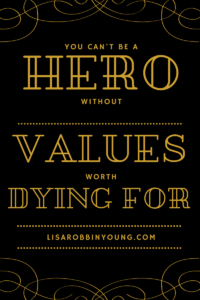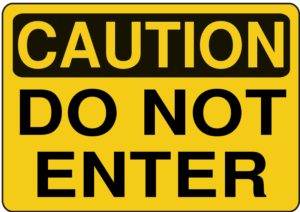Every hero has values to which he clings. Superman had "truth, justice, and the American way" while MacGyver believed his mind was more effective than guns for solving problems. Some values are more honorable than others, but you can't be a hero without values worth dying for.
 Not a concept that's widely embraced in the business world. Not too many corporations that I'm aware of would lay down their lives for the work they do (or the workers that do it). The very nature of a corporation is to generate a profit for shareholders - and sometimes doing what's right may mean NOT generating profit for shareholders.
Not a concept that's widely embraced in the business world. Not too many corporations that I'm aware of would lay down their lives for the work they do (or the workers that do it). The very nature of a corporation is to generate a profit for shareholders - and sometimes doing what's right may mean NOT generating profit for shareholders.
So is it possible to be heroic in business? Absolutely. Because doing the right thing is always in style, even if the shareholders disagree.
Men and women of action always have a choice. We can choose to value principles over profit, people above things, and not be a martyr in the process. We can do what's right, knowing that the long-term reward is far greater.
And no, I'm not talking about "eternal rewards" or heaven here. I'm talking about the tough decision to close a business segment that's losing money, and shifting those people and resources into areas where better work can be done. I'm talking about the tough decision to NOT fire good people if they can be used elsewhere, even if it means a short term cashflow pinch (not crisis, mind you. That's different.).
I'm talking about having values worth dying for.
When "the world" tells you how things "should" be, even thought your gut tells you otherwise, and your values guide you in a different direction, do you cave? Or do you choose to be the action hero?
Will you take a short term beating for a long term gain?
So many people will do anything to avoid even the slightest amount of pain. Yet, pain is a part of growth. Discomfort & uncertainty abound in entrepreneurial circles. You can't avoid it if you want to grow. And yet, time and again I see people take what appears to be an "easy" way out, only to find themselves stuck in "the fire swamp" because they didn't trust their gut.
Remember, heroes are not above getting bloodied up a bit - so long as the fight is in alignment with their values.
As you examine your own business, think about these questions:
If you can't answer these questions, you've got your work cut out for you. It would be nice if you could stop and get absolute clarity on this before you do anything else. However, I recognize that's not always practical.
Remember, this isn't about issuing a "vision statement" or some other piece of equally benign paper. Show, don't tell. "Be the change you want to see" and all that.
Take a few minutes to share with me (via email or as a comment on this post) any/all of the following:
A. What do YOU value in life and business?
B. What did you learn when you asked others what they think you value?
C. Based on what you know about me, what do you think I value?
I'm sharing my results in a later post. I'm looking forward to seeing what happens!
[Note: I originally wrote this post a few years ago, for my Business Action Hero website. I've refreshed it here because it's still relevant - maybe now more than ever.]
"If you are deliberately trying to create a future that feels safe, you will willfully ignore the future that is likely.”
- Seth Godin

It hit me between the eyes. This painful, jarring sensation at far too early on a Sunday morning - on a holiday weekend no less. This strange need for safety that we all seem to crave - even go out of our way to re-inforce.
Even if the result is less comfortable than pursuing change.
We don't want to rock the boat and get people mad at us. So we stay in the comfort zone. Maybe we push a little here and there, but we're not really making true progress on our own path.
It's here where we have to choose:
Because safety is the ultimate risk. Hoping and praying that nothing will change. Images of ostriches with their heads in the sand come to mind. They can't see that tornado bearing down on them, but golly, they sure feel safe!
[tweet "When it comes to owning your dreams, safety is the ultimate risk."]
Back in 2010, I had the honor of interviewing best-selling author Jonathan Fields about the upside of being an entrepreneur. During that interview, he said something that has stayed with me:
"There is no sideways in life. It's an illusion. There's only up and down. Usually this is the most horrifying scenario of all."
- Jonathan Fields
At first, I didn't want to believe it, but my own experience has validated that there's no standing still. You're either moving forward (as you define it) or you're getting left behind. When I interviewed him again for his second book, "Uncertainty", he offered up this gem:
"If you want to do great things in the world, you have to go to a place where you don't know how it's going to end."
- Jonathan Fields
(You can listen to that interview here.)
Since then, he's launched the Good Life Project and Revolution U, all the while, going where he'd never gone before. It's been fascinating and fun to watch. Clearly, this is a guy that continues to choose "adventure" over "safety".
Safety is your nemesis.
I don't mean you should recklessly throw caution to the wind. We need to be smart about the risks we're taking. Safety and security is one thing most of us crave - it's the foundation of Maslow's Hierarchy of Needs. Without it, we don't feel like we can move forward.
But once we "have" it, we're less likely to move forward because of it. Safety means we don't have to push, strive, or work as hard because, well, we're safe, and nothing's going to happen to us in our safe space, right?
That's a wicked catch-22.
Safety works hard to keep you stuck - just as hard as you work to plow forward in your adventure.
"What if they don't like it?"
"What if they think I'm crazy?"
"What if it flops?"
"What will _____ say?"
"That's too hard/easy/fast/slow/tedious/tiresome/boring/good for me."
"I'd love to but I don't have enough ______ (or I am not ____ enough)."
We judge ourselves so harshly that we don't give ourselves a fighting chance. Let's change that!
Remember: perfection is an illusion. You're already as perfect as you're gonna get. You're human. To expect perfection 100% of the time will only cause more judgement (pain, resentment, frustration). Stuff happens that we call "failure". Big deal. Take a moment to celebrate the wins, stop staring at the door that closed, and look for your next steps.
The nature of a nemesis is that it has an equivalent level of power and sway. Think of The Joker and Batman, Prof. Moriarty and Sherlock Holmes. A nemesis is not easily defeated, but can be thwarted and often contained. It is when you underestimate your nemesis that it takes a foothold, and often wins a battle or two.
Simple, but not easy.